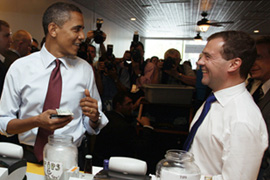Global powers still play spy games
Constant spying goes on between nations and many methods remain unchanged, analysts say.

 |
| There was no clue in initial court papers about how successful the so-called agents had been [AFP] |
The claims by US authorities that they have broken up a Russian spy ring that has been operating inside the country for the last decade seem like a flashback to the Cold War.
But although many people had assumed that intense rivalry between intelligence agencies, such as the CIA and KGB, were a thing of the past, the fact is that nations still want to know what their enemies, and even their friends, are thinking.
Glenmore Trenear-Harvey, a former British intelligence officer, told Al Jazeera that the alleged actions by the 11 suspects accused of acting as agents of a foreign government were likely “part of the constant spying that goes on between these nations”.
Ten of the suspects were arrested arrested in Boston, New York, New Jersey and Virginia on Sunday and accused of recruiting political sources and gathering information for the Russian government.
‘Illegals’
There was no clue in initial court papers about how successful the so-called agents had been, but they were alleged to have been long-term, deep cover spies, some living as couples.
Such agents, known as “illegals,” take civilian jobs with no visible connection to a foreign government, rather than operating from government jobs inside embassies and military missions.
 |
| Neighbours say the alleged agents did little to arouse suspicions [AFP] |
They were not assigned to collect classified, secret information, a justice department official said, but were allegedly tasked to learn about a broad swath of topics.
Areas they were accused of covering included nuclear weapons, US arms control positions, positions on Iran, White House rumours, CIA leadership turnover, the last presidential election, congress and political parties.
Oleg Gordievsky, a former KGB colonel and double agent for the British, said Russia has had “dozens and dozens of unofficial” spies working in the US.
He said that Moscow had, over the years, come to believe these were “immune” to detection, and sent increasing numbers of agents not only to the US but also to other Western powers, like France, Germany and Britain.
“This is a case of the United States simply telling Russia, ‘for 20 years we have tolerated your activites in our country and we are now saying we are watching you and we will act if you do not stop’,” Gordievsky said.
‘Dead letter drops’
The methods allegedly used by the suspected spies also read like something from a novel, with two of those arrested reported to have delivered messages written in invisible ink to Russian officials during a visit to South America.
Others were observed receiving bags and packages of money from Russian officials, including an incident in which two suspects “dug up a package containing money that had been buried in the ground” by another suspect two years earlier, according to the justice department.
Searches of safety deposit boxes reportedly turned up birth certificates used to create false identities, including one of a Canadian man who actually died in 2005.
Sources were referred to using code names such as “Farmer”, “Cat” and “Parrot”, the FBI said.
“It is classic, almost John Le Carre stuff, of brush passes [where spies exchange identical bags as they pass each other], dead letter drops [a location used to secretly pass items between two people], assuming legends [creating a personal history by taking on the identity of a dead citizen or creating a completely new false identity] and such like,” Trenear-Harvey said.
“However, there is an overlay of the digital age, they are using wi-fi, their own private wi-fi, and something called steganography.
“When you send an email with an attachment, buried inside that photograph, in the equivalent digital micro-dot, is information they could send back to Moscow, but it really is extraordinary.”
Some of the suspects were said to have sat in cafes or bookstores, using their laptops to send electronic messages to Russian officials driving past.
Coded data, known as radioframs, was also said to have been sent over shortwave radio.
Timing questioned
Despite the extensive revelations contained in the court documents released on Tuesday, an air of mystery still surrounds the timing of the allegations.
Just days ago, Dmitry Medvedev, the Russian president, was in the US for talks with Barack Obama, his US counterpart, seen as key to “resetting” relations following tensions over Russia’s conflict with Georgia, a key US ally, in August 2008.
 |
| Obama and Medvedev shared a burger during the Russian president’s visit to the US [AFP] |
The two leaders were filmed enthusiastically sharing a meal at Ray’s Hell Burger in Arlington, Virginia, and media reports focused on commonalities between the two nations.
“I find the most extraordinary thing of all though, not the spying, it’s the timing,” Trenear-Harvey said.
“Why now? Just after Medvedev and Obama had that famous munching away at the hamburgers together.
“I think it’s a sort of balancing, it’s sending a message to Russian intelligence that the Americans, the FBI, had these people under surveillance for so long and indeed ran an operation where they enticed some of these alleged spies to take actions that exposed themselves.”
But Ivan Safranchuk, an analyst at the Moscow State Institute of International Relations, said that the the outing now of the alleged spy ring after years of investigation could be a further sign of improving ties.
“I would suggest that the current level of relations does suggest that something … was shared between the Russian and American authorities,” he told Al Jazeera.
“And I would say that from my point of view, the choice of time that this story is revealed after the visit is probably a reflection of Russian and American relations going well.
“Because if such a story was revealed before the visit of President Medvedev to the United States then that would have made the visit very cloudy.”
What is clear following this news is that however strong the ties between nations there will always be a temptation to find out if there is something that the other side is not telling, and, whether friend or foe, there could always be value to that information.